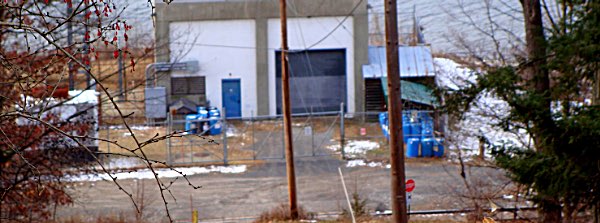- By Dan Veaner
- News
 Print
Print  The existing Bolton Point Raw Water Pump Station. Poison Ivy Point is to the south (left) of this building, and the newly proposed parcel is to the north.
The existing Bolton Point Raw Water Pump Station. Poison Ivy Point is to the south (left) of this building, and the newly proposed parcel is to the north.Village of Lansing officials considered a plan Monday to purchase a parcel of land that would provide a location for a second Raw Water Pump Station for the Bolton Point Water Commission, as well as additional 'forever-wild' park areas for the Village. Trustee John O'Neill said the plan would benefit Bolton Point, but he questioned the benefit of Village taxpayer money being used to purchase effectively unusable land.
"The Village would purchase the parcel," Mayor Donald Hartill replied. "It would then be subdivided. A piece of it would then be sold to Bolton Point. Another piece of it would be sold as a building plot. We would end up with a hillside, but also a fair amount of (lake) frontage. It's partly to help Bolton Point. We really need to expand the input plant. The current situation is that Bolton Point would have to buy the entire parcel. This is a way of softening that blow by at least a factor of three. In the end we'd probably pay about a third of the cost for the parcel."
Bolton Point gets water for its member municipalities from a 36 inch pipe that extends from a raw water pump station 400 feet into Cayuga Lake. The water is pumped about 280 feet up the hill to the water treatment plant on East Shore Drive, where it is filtered and processed before it is transported to the Burdick Hill storage tank, and then to the municipalities that jointly own the water system. The water commission is currently working on a plan to add a second raw water pump station that would assure uninterrupted service. At a December 6th meeting General Manager Steve Riddle told water commissioners that the Village of Lansing is willing to purchase the parcel, and then sell a portion to the commission.
The Village already owns a lakefront park immediately to the south of the raw water pump station. Poison Ivy Point is a bump of land that juts into Cayuga Lake, with an attractive beachfront and lagoon. In a recent update to the Village Greenway Plan former trustee Lynn Leopold argues for keeping the park "in as natural a state as possible", and Trustees appear to be willing to follow her advice. Hartill says that the new park and the hillside portion of the property would likewise be"forever wild".
O'Neill pointed out that taxpayer money would go toward purchasing the land, and also to pay for Bolton Point's portion of the land purchase, but Hartill said that the Bolton Point portion is paid for by water fees paid by customers in all the participating municipalities, which include the Towns of Lansing, Dryden, and Ithaca , and the Villages of Lansing and Cayuga Heights. Hartill said that the Village has purchased land in the past for the purpose of preserving it as "forever wild", including the fairly recent purchase of land on which Marian Hartill Park is located. Most of that property has remained forested with the exception of a portion on the north side that is occupied by the park, plus a trail through the woods that lets out on Dart Drive. He said the
"It would be an undeveloped park, forever wild," Hartill said. "That's the whole point - preserving a hillside and a portion of the lakefront, just like Poison Ivy point. People could go there, but there wouldn't be benches or docks or anything else."
Both parks and the pump stations are accessed by Bolton Point Road, a steep road that is owned and maintained by the Village. While Bolton Point pays the Norfolk Southern Railroad for the right to access its pump station, it is currently illegal to cross the railroad tracks to get to Poison Ivy Point. Boaters can legally access the park, but you have to cross the tracks to reach it by land. Hartill says that he plans to negotiate access for one crossing point from which people could turn left to get to Poison Ivy Point, or right to access the new lakefront park.
"That's another negotiation that I'm starting," Hartill said. "Bolton Point is currently paying about $1,000 a year for access. I would expect that we would be stuck with a bill for about the same."
In November an agreement between Bolton Point and the railroad was finalized that will allow the new pipe that will connect the second raw water pump station and the treatment plant to cross under existing railroad tracks. The water commission paid the railroad $31,500 to obtain that agreement.
Hartill said the Trustees should consider the idea before deciding to negotiate for the land.
"It's an opportunity, but it's more being a good citizen, trying to make sure that we have an adequate water supply in the end," he said.
v15i1



